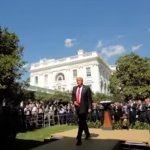Former Lagos State Governor and ex-Minister of Works and Housing, Babatunde Raji Fashola (SAN), has called for the preservation of Lagos’ rich historical heritage through conscious street naming and urban planning policies. Fashola made this known during a public lecture on urban identity and memory, organized by the Lagos State Historical Preservation Council at the Muson Centre, Onikan.
Speaking to an audience comprising urban planners, historians, lawmakers, and members of the civil society, Fashola stressed that street names in Lagos are more than mere labels—they are critical instruments for preserving the cultural and historical memory of the city.
>Every street name is a marker of history,” he said. “It reminds us of where we’re coming from, the heroes we’ve had, the events we must not forget. When we erase or arbitrarily rename streets, we risk losing the identity and soul of Lagos.”
The former governor, known for his urban renewal policies during his time in office, decried what he described as the “growing trend of politically motivated renaming of streets,” warning that such actions often neglect the socio-cultural significance attached to existing names.
Fashola particularly referenced the renaming of key roads and landmarks that once bore the names of Lagos’ indigenous leaders, colonial-era infrastructure, and nationalist icons.
>We must ask ourselves: when we rename streets, who are we erasing? Whose stories are we burying?” he asked.
He advocated for a more structured approach to street naming, suggesting that any proposed changes should involve input from historians, cultural institutions, and local communities.
Reacting to Fashola’s remarks, Lagos State Commissioner for Physical Planning and Urban Development, Dr. Oluyinka Adebayo, said the government is reviewing its street naming policy to reflect historical accuracy, inclusiveness, and local relevance.
>The Ministry is already working with traditional rulers and cultural preservationists to ensure that future naming exercises are aligned with our collective memory,” Adebayo said.
Cultural activist and historian, Mrs. Modupe Onabanjo, applauded Fashola’s comments, adding that several indigenous street names have already disappeared in areas like Lagos Island, Yaba, and Surulere, replaced by generic or foreign-sounding names.
We must defend our narrative,” she said. “Lagos is not just a mega city. It is a city with history, with people, and with pride.”
The event ended with a call for legislation that would protect historically significant street names and mandate thorough historical audits before any renaming is carried out.
As Lagos continues to expand and modernize, Fashola’s remarks have reignited a crucial debate about the balance between urban growth and the preservation of cultural heritage in Nigeria’s commercial capital.



























